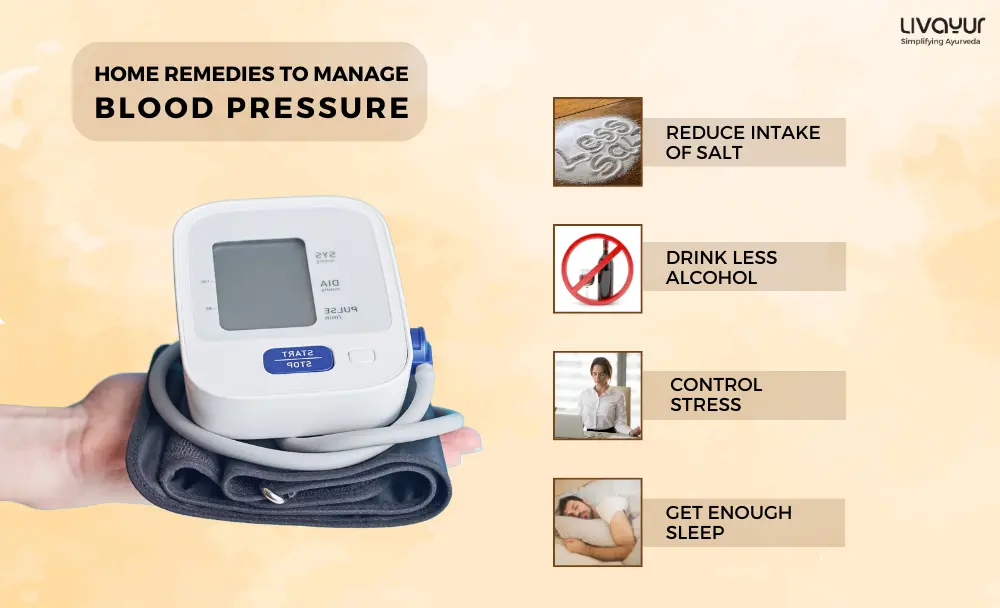
High blood pressure, or hypertension, is a widespread medical condition characterized by excessive blood force in the vessels. It can affect individuals of all ages and genders, underscoring the need for awareness due to its potential risks. Often dubbed the “silent killer,” high blood pressure typically lacks noticeable symptoms, necessitating regular monitoring for effective management. In this article, we’ll explore natural home remedies to lower high blood pressure, contributing to improved cardiovascular health. Read on to learn more.
What causes high blood pressure
High blood pressure can be a result of the following factors.
1. Gradual Development
High blood pressure typically develops over time, often progressing gradually rather than arising suddenly. [8]
2. Unhealthy Lifestyle Choices
Sedentary lifestyles, characterized by insufficient regular physical activity and poor dietary habits, significantly contribute to the development of high blood pressure. Lack of exercise and unhealthy eating patterns can lead to weight gain, a common precursor to hypertension. [8]
3. Health Conditions
Certain health conditions amplify the risk of developing high blood pressure. Individuals with diabetes face an elevated likelihood of hypertension, as do those grappling with obesity. These health conditions impact overall well-being and directly influence blood pressure levels. [8]
4. Pregnancy
High blood pressure can manifest during pregnancy, a condition referred to as gestational hypertension. This temporary rise in blood pressure during pregnancy necessitates careful monitoring and management to ensure the well-being of both the mother and the baby. [8]
Symptoms of hypertension or high blood pressure
Here are a few things to know about the symptoms of high blood pressure. [8]
- High blood pressure is challenging as it happens without warning signs or symptoms.
- Individuals may unknowingly live with hypertension, as the condition often develops silently over time.
- Unlike some health issues that may exhibit noticeable symptoms, measuring blood pressure remains the sole reliable method to determine whether one has high blood pressure.
- Regular monitoring is essential, especially considering the potential long-term consequences of uncontrolled hypertension on cardiovascular health.
Home Remedies for High Blood Pressure
- Getting Exercise
In Ayurveda, isotonic exercise, such as walking, has been shown to reduce blood pressure and other physiological changes. In a study, the rise in diastolic blood pressure immediately after performing isotonic exercise for five minutes was significantly lower in Vata-Kapha individuals than in Pitta-Kapha and Vata-Pitta individuals. This suggests that isotonic exercise may be beneficial for people with hypertension, especially those with a Vata-Kapha constitution. [1]
Also learn about the three doshas
2. Reduce Intake of Salt
Eating too much sodium can raise your blood pressure. You can reduce sodium intake by reading food labels, avoiding processed foods, cooking with fresh or frozen vegetables, and seasoning your food with herbs and spices instead of salt. [2]
3. Drink Less Alcohol
Drinking less alcohol can help lower blood pressure by reducing the effects of these factors. For people who already have high blood pressure, cutting back on alcohol can lead to significant reductions in blood pressure. In some cases, it can even help people achieve normal blood pressure levels. [3]
4. Control Stress
Yoga and meditation are ancient practices that can help reduce stress and anxiety. When we are stressed, our sympathetic nervous system is activated, which can lead to an increase in heart rate, blood pressure, and breathing. Yoga and meditation can help to calm the sympathetic nervous system and reduce these stress-related symptoms. Yoga breathing exercises, such as pranayama, can help to slow down the breath and bring the body into a state of relaxation. [4]
5. Get Enough Sleep
Studies have shown that a lack of sleep can increase stress and blood pressure. Ayurveda also emphasizes the importance of sleep for good health. Ayurveda recommends getting 7-8 hours of sleep per night and establishing a regular sleep routine. This will help to ensure that you get the rest you need to lower your blood pressure and improve your overall health. [4]
6. Go For Power Walk
Researchers found that walking is more effective than jogging at reducing hypertension. This is because walking causes the arterial blood vessels to dilate, or widen, which reduces the amount of pressure that is produced. In one study, hypertensive patients who went for brisk walks lowered their blood pressure by an average of 8 mmHg, compared to 6 mmHg for those who jogged. [5]
Natural Ayurvedic Home Remedies for High Blood Pressure
7. Consuming Black Cumin Seeds (Nigella Sativa)
Nigella sativa, also known as black seed, has been used in Ayurveda for centuries to treat various health conditions, including hypertension. The active compounds in black seed, such as thymoquinone, have antioxidant, anti-inflammatory, and vasodilating properties. These properties may help to reduce blood pressure by relaxing the blood vessels and improving blood flow. [6]
8. Indian Snakeroot (Rauwolfia Serpentina)
Indian snakeroot, particularly Rauwolfia serpentina, reduces blood pressure by inhibiting catecholamines in nerve cells. This lowers the heart rate and relaxes blood vessels. Other alkaloids in snakeroot also contribute to this antihypertensive effect. [6]
9. Celery Seed
Celery seed contains a compound called phthalide, which has been shown to relax the walls of blood vessels. This allows blood to flow more easily, which can help to lower blood pressure. Phthalide also helps to reduce inflammation, which can contribute to high blood pressure.
In addition to phthalide, celery seed also contains other compounds that may help to lower blood pressure. [7]
10. Practise Deep Breathing
In Ayurveda, deep breathing is known as Pranayama. Pranayama is the practice of controlling the breath to bring about physical, mental, and spiritual benefits. One of the benefits of pranayama is that it can help lower blood pressure.
When you breathe deeply, you take in more oxygen, which helps to relax the body and mind. This relaxation helps to reduce the production of stress hormones, such as cortisol, which can raise blood pressure. Deep breathing also helps to slow down the heart rate, which further lowers blood pressure. [7]
11. Eating Ginseng
In Ayurveda, ginseng is believed to have a balancing effect on the body’s Doshas, or energies. It is thought to increase the production of nitric oxide, a molecule that helps to relax blood vessels and lower blood pressure. Ginseng also contains compounds that can help to reduce inflammation, which is another factor that can contribute to high blood pressure.
Several studies have shown that ginseng can help lower blood pressure in people with hypertension. For example, one study found that taking 3 grams of ginseng extract daily for 8 weeks significantly lowered systolic blood pressure (the top number in a blood pressure reading) in people with mild to moderate hypertension. [6]
12. Eating Watermelon
Watermelon is a good source of L-citrulline, an amino acid that helps to relax blood vessels. This can help to lower blood pressure by reducing the resistance that blood encounters as it flows through the arteries. Watermelon is also a good source of potassium, which helps to balance the effects of sodium in the body. High sodium levels can contribute to high blood pressure. Additionally, watermelon is a good source of antioxidants, which can help to protect the heart and blood vessels from damage. [6]
When to seek medical help for high blood pressure
Here are some guiding points on seeking medical attention for high blood pressure. [8]
- Given its asymptomatic nature, seeking medical help for high blood pressure is essential.
- If you are diagnosed with hypertension or have risk factors for the condition, like a family history of high blood pressure, consult a healthcare professional promptly.
- Seeking medical attention is crucial if you experience symptoms that might indicate severe hypertension, like severe headaches and chest pain.
- Any abrupt and severe changes in blood pressure need urgent attention.
- Routine blood pressure checks during regular healthcare visits are ideal. Any consistently elevated readings should prompt a discussion with a healthcare provider.
Conclusion
By making simple lifestyle changes, such as eating a balanced diet, exercising regularly, and managing stress, anyone can take control of their blood pressure and improve their overall health. These natural methods offer a safe and sustainable approach to managing hypertension, reducing the risk of associated health problems, and leading a healthier life.
FAQs
1. How can I bring my blood pressure down right now?
Practice deep, slow breathing exercises, engage in relaxation techniques like meditation, and avoid stimulants like caffeine. Additionally, a brisk 10-minute walk can positively impact blood pressure. However, adopt long-term lifestyle changes for sustained improvements, including a healthy diet and regular exercise.
2. Can high BP be cured naturally?
While high blood pressure may not be completely cured, you can effectively manage it through natural approaches. Lifestyle modifications are crucial, including adopting a heart-healthy diet and maintaining a healthy weight. However, contact a healthcare professional for personalized advice.
3. Does lemon water bring your blood pressure down?
There is limited evidence to suggest that lemon water directly lowers blood pressure. However, staying adequately hydrated is crucial, as proper hydration can support cardiovascular health. Viewing lemon water as part of a balanced, heart-healthy diet and other lifestyle modifications is essential.
4. What is the fastest thing to lower blood pressure?
The fastest way to lower blood pressure in the short term is through relaxation techniques and deep breathing exercises. Engaging in slow, deep breaths for a few minutes can immediately calm down and help temporarily lower blood pressure.
Disclaimer:
This article is written from a health and lifestyle perspective. It is for general information and is not meant to substitute any medical advice. Please consult your doctor for appropriate medical consultation.
References:
- https://www.ncbi.nlm.nih.gov/pmc/articles/PMC3034969/
- https://www.ncbi.nlm.nih.gov/pmc/articles/PMC6770596/
- https://www.ncbi.nlm.nih.gov/pmc/articles/PMC8130994/
- https://www.ncbi.nlm.nih.gov/pmc/articles/PMC8403283/
- https://www.ijsr.net/archive/v4i10/SUB159256.pdf
- https://citeseerx.ist.psu.edu/document?repid=rep1&type=pdf&doi=3c55f6bfed678892edbe3cf965f0da0c3b388b7a
- https://www.ijsr.net/archive/v4i10/SUB159256.pdf
- High Blood Pressure Symptoms and Causes




















